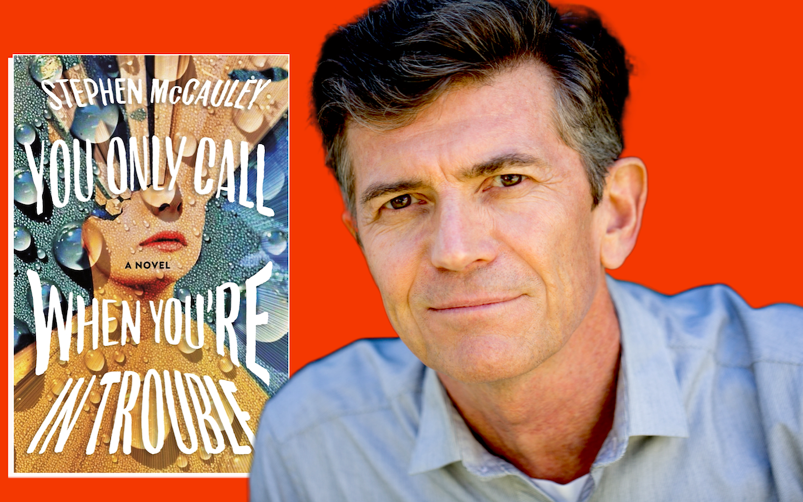
If you’re lucky enough, you’ll become an old gay. And while you might not always feel lucky standing in front of a full-length mirror examining sagging buttocks or line-furrowed brow, author Stephen McCauley will likely tell you differently.
Since 1987’s The Object of My Affection (adapted into the 1998 film starring Paul Rudd and Jennifer Aniston), the best-selling author has lured readers with gay protagonists who muddle their way through relationships amid a shifting cultural landscape. Throughout the decades, McCauley has drawn from his lived experiences to craft humorous queer narratives dappled with melancholy like sun spots on a balding forehead.
Related:
Revisiting the 1998 gay rom-com ‘The Object of My Affection’ with author Stephen McCauley
It’s been 25 years since “The Object of My Affection”, based on the 1987 debut novel by Stephen McCauley, opened in theaters.
McCauley’s latest book, You Only Call When You’re In Trouble (Henry Holt & Co., January 9, 2024), reveals a host of complex characters, the generational divide that comes with facing the final chapter of one’s career, and the questionable value of monogamy.
Tom, a modestly successful architect, wonders if he can manage to stave off new incoming demands from his family long enough to get his masterpiece — a tiny house for an absurdly wealthy and equally difficult client — built. Amid the professional tumult, his niece faces Title IX allegations that threaten her university job, his boyfriend bolts, and his eccentric sister opens a retreat center with a domineering business partner. Add questionable paternity into the mix, and Stephen McCauley has set the stage for another intriguing read. (And maybe another film adaptation? We envision David Hyde Pierce as Tom.)
Is it ever all right to stop caring for others and start living for yourself? That is the question You Only Call When You’re in Trouble asks — and at least partly answers. Queerty obtained exclusive excerpts, which offer an insider’s look at McCauley’s latest gay character.
The set-up: Tom Kemp is a gay, 63-year-old architect specializing in tiny houses. As You Only Call When You’re in Trouble opens, he has a final opportunity to build his career-defining masterpiece.
Tom had turned sixty-three earlier in the year. He sometimes felt as if he were in a nail-biting race with the planet to see which of them died first. He hoped it would be him. He didn’t see himself as a likely candidate for heroism and survivalist ingenuity. One of the benefits of the climate crisis was that it made him relieved rather than anxious that there was no history of longevity in his family. Even so, he wanted career redemption, and Charlotte’s guesthouse was his last chance to grab it.
Tom wasn’t pessimistic by nature, but these days, given global politics, imminent environmental collapse, and the state of his own personal life, optimism, like choosing to make a movie in black and white, was a charming anachronism best saved for special occasions.
The set-up: As for the state of Tom’s personal life, his younger boyfriend, Alan, has recently left him, claiming that Tom was insufficiently devoted to him. Tom still hasn’t recovered from the blow.
Almost everyone Tom knew seemed to like Alan more than they liked him. Tom couldn’t blame them; he liked Alan more than he liked himself. Alan was good with dogs and children. He played the piano well enough to charm people but not so well as to be intimidating. He teared up at weddings. He was a nurse, and as if that weren’t sympathetic enough, he worked with a pediatrician. He was ten years younger than Tom, a fact that had once made people look at Tom as if he must be sexually desirable but that, lately, made them look at him as if he must be sexually predatory. His friends had always resented Tom for having snagged Alan—not exactly a beauty, but unmistakably a catch. Now, confoundingly, the few people he’d told about the split seemed to resent him for not hanging on to him.
He’d never stopped finding Alan attractive and had never stopped enjoying sex with him, even if there were occasional others. He and Alan had an understanding that they were committed but without the pretense of monogamy, a concept both agreed was as unsustainable and unhealthy as a raw food diet and, in the case of male couples, as cloying as matching sweaters. Tom had always enjoyed a certain amount of vulgar, furtive sex to balance his otherwise always responsible behavior. Of all the many wonderful things you could have with a long-term partner, furtive vulgarity was perhaps the most difficult to sustain.
Unfortunately, after years of a lackluster sex life—sustaining an erotic attraction for ten years was a challenge; not even refrigerators are expected to last that long anymore—Tom found himself erotically fixated on Alan. His familiarity of every inch of Alan’s body, all his freckles and flaws, once the source of fond boredom, now provoked lurid fantasies that were entirely inappropriate for his age.
Come to think of it, all fantasies and aspirations were inappropriate for his age. Upon turning sixty, you were supposed to settle back into the lonely bed you’d made and live with the consequences. To want more, personally or professionally, an ardent love life or an architectural legacy project, meant depriving a younger person who hadn’t had and the opportunities you’d already been presented with and blown—and who, by the way, wasn’t responsible for the destruction of the planet.
Tom was willing to accept responsibility for having made things difficult in their relationship. Who was perfect? It was undeniable, though, that Wendy Briske, Alan’s humorless but jauntily named therapist, deserved some of the blame. Tom was almost certain that if it hadn’t been for Wendy’s expensive advice and smug dominatrix personality, they could have patched over their problems and moved on. He regretted having supported Alan’s decision to go into therapy, especially with a woman who was probably Cecily’s age and had (he’d observed the one time he joined Alan in a session) that generation’s eagerness to hunt down, unearth, buff, and polish every scrap of experience that could be put on the trophy shelf of Slights, Insults, Microaggressions, and Trauma. Wendy had convinced Alan he was a Victim, the highest praise she could bestow.
The set-up: Tom does have an erotic life without Alan, although it’s not one he’s eager to advertise.
Tom had learned that an important part of aging with dignity was pretending that you had no sex life and didn’t want one. The public had grown used to public declarations of racism, the details of frequent mass shootings, gruesome images of gastric bypass surgery that played on TV for entertainment value. The one thing no one could stand to hear about was the sexual desire, never mind the sexual activity, of someone in their sixties.
When Alan told him he was moving out, Tom had been working with a married couple named Marek and Eveline Bachar. They were rich and glamorous, the glamour coming largely from the money and a degree of confidence that Tom found compelling and mysterious, especially in people whose physical beauty was mostly related to the perfect tailoring of their clothes. Also, they were affectionate with each other in such an open and spontaneous way, it made Tom happy. It was always easier to be sentimental about someone else’s relationship than it was to be sentimental about his own.
At a certain point in the process, Marek took Tom out for lunch and then asked to go back to his place to see, in person, the guest cottage on his property.
“It’s very small,” Tom said, “and very specific. Designed for my niece based on her childhood drawings. It’s not representative of what I’d design for you. Or for anyone else.”
“Oh, I know, I know, I’m just curious.”
Tom brought Marek back to his house, and halfway through the tour, Marek made a blunt and unambiguous pass. The indiscretion that ensued with Marek was unfortunate from beginning to end: a journey of three brief encounters. Among other things, Tom genuinely liked Marek’s wife more than he liked Marek. He wasn’t unattractive—those perfectly tailored suits!—but Tom was lured into the mess out of sheer amazement that Marek had come on to him. These days, Tom viewed every sexual opportunity as the erotic equivalent of the last swim of summer, as a hard to resist as a sandwich (even an unappetizing one) purchased before boarding a six-hour flight without meal service.
The set-up: Overhanging all of Tom’s personal and professional woes are his infuriating but irresistible sister, Dorothy, and her daughter, Cecily, the love of his life, even if his niece only calls him with problems.
Whatever her problem was, he was not going to get involved. After all, his inability to tamp down his feelings of responsibility for her was one of the reasons Alan had left him.
It’s not that I don’t admire you for caring for her so much. Seeing how good you are to her was one of the reasons I fell in love with you. It’s just that I now know I’ll never come first in your life.
From the first moment he picked up newborn Cecily in the hospital where Dorothy had given birth and looked into her pretty, worried face, he’d felt an absolute commitment to be available to her. She seemed to be saying to him, in those first moments of her life, You’re going to help me deal with my mother, aren’t you? Please? And, silently, he had answered, Yes, of course. Always, and had kissed her brow. He fell in love with her with an intensity he hadn’t experienced before or since. Alan had an entirely valid point about how central she was to him.
A big part of his life had been spent making up to her for all the overflowing ashtrays and overheard confessions she dealt with as a child—though, on the whole he was suspicious of people who placed excessive importance on family connections and the disturbing notion of “blood.” Like religious beliefs, those ideas were often presented as the source of empathy, love, and generosity, but were more often used as excuses for doling out those things selectively. And yet, what he felt toward Cecily was inseparable from the fact that she was his sister’s child, a status that gave him some claim to her.
This article includes links that may result in a small affiliate share for purchased products, which helps support independent LGBTQ+ media.





















dbmcvey
Yay! He’s such a great writer!
Kangol2
I do like his work but the passages about the fling with Marek feel like a lot of summary and were kind of blah. I guess I’ll have to check out the entire book–from the library, in this case.